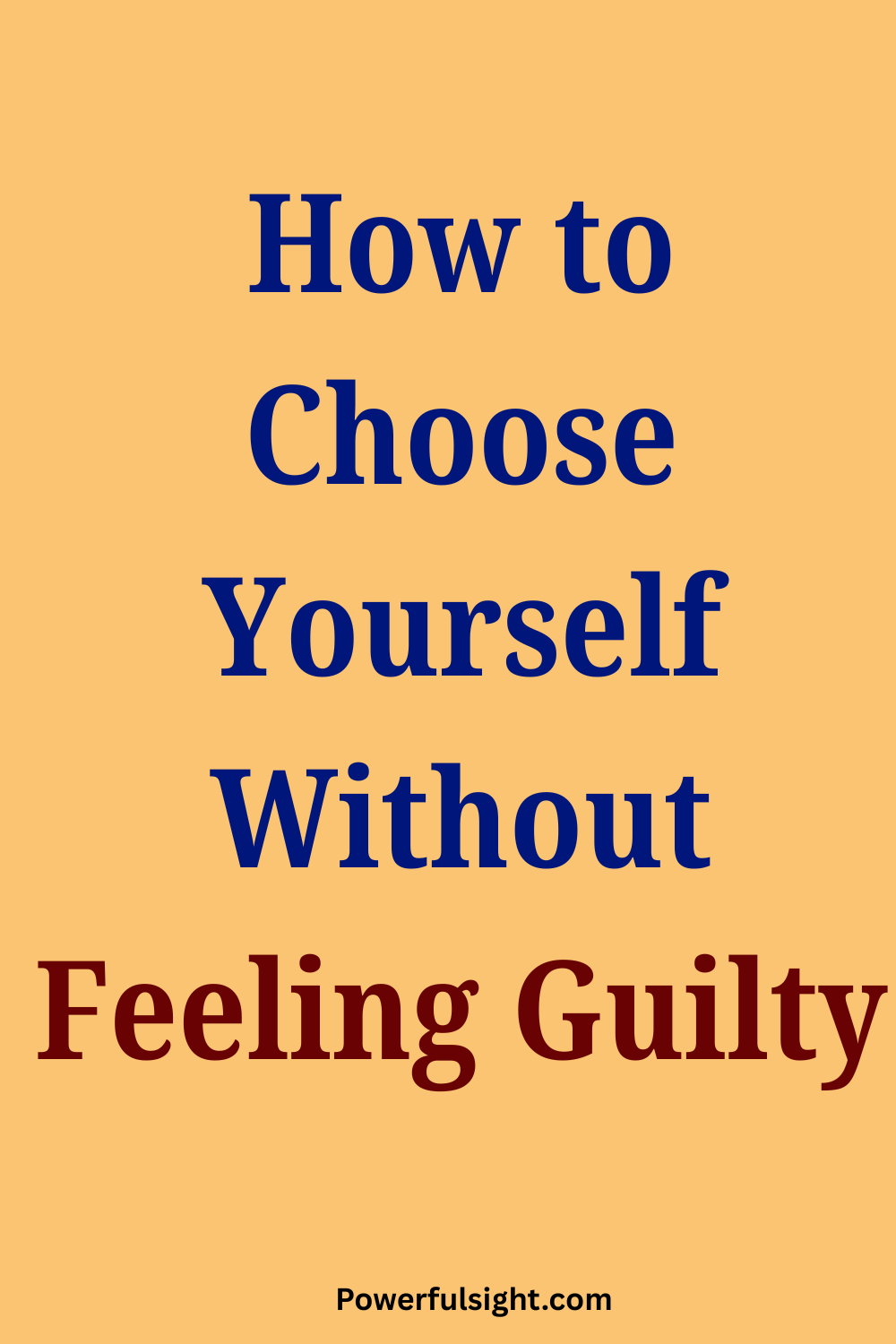There is a moment in life when you wake up to the fact that for years, you have been trying to be what everyone else needed you to be. You’ve been the dependable one, the listener, the problem-solver, the one who would always show up. You’ve given, compromised, and carried the weight of other people’s happiness in your arms.
And now, when it’s your turn to rest—when it’s your turn to say “no,” when it’s your turn to put yourself first—guilt creeps in like a slithering shadow.
Am I being selfish?
Will they think I’ve changed?
And so you give, and give, and give, until there is almost nothing left to give.
But here’s the truth: choosing yourself is not selfish. It is survival. It is the only way to build self-respect, mental clarity, and emotional health. The hard part is not realizing that you need to choose yourself—it’s knowing you need to, yet drowning in guilt each time you try.

How to Choose Yourself Without Feeling Guilty
1. Understand What It Means to Choose Yourself
Choosing yourself does not mean turning your back on everyone else. It doesn’t mean abandoning love, family, or responsibility. It simply means that you are as much a priority to yourself as others are to you.
Choosing yourself is the quiet act of caring for yourself as well as you care for those around you. It’s the kind gesture of including yourself in the circle of people you nurture and protect.
It means making decisions that support your well-being instead of sacrificing it at the altar of others. It might mean sleeping when you’re exhausted, setting boundaries with those who take you for granted, saying no to obligations that drain you, or walking away from a relationship that no longer serves you.
You can be kind, generous, and loving—and still choose yourself. In fact, the more you care for yourself, the more genuinely kind you become. When you choose yourself, your kindness flows from love instead of obligation.
Related: How To Stop Comparing Yourself To Others
2. Recognize Where the Guilt Comes From
The guilt you feel each time you put yourself first didn’t appear overnight. It was taught.
As children, many of us were taught that a “good” person puts others first. That love means sacrifice. That humility means neglecting your own needs.
So when you start to step outside that pattern, it feels wrong, even though it’s healthy.
That guilt is simply an old reflex. It’s your brain’s way of protecting you from what it perceives as social rejection. It believes that if you change the rules, you’ll lose love. But guilt doesn’t mean you’re doing something wrong—it means you’re doing something new.
Repeat this to yourself often: Feeling guilty is not proof that you made a bad choice. It’s proof that you were conditioned to ignore yourself for far too long.
Related: How to Stop Putting Yourself Down
3. Start Small
You don’t have to make a grand announcement that you’re “choosing yourself” from this day forward. You can start quietly—small and gentle.
Begin by tuning in to your own needs throughout the day. Ask yourself:
-
What do I need right now?
-
Am I tired, or just used to pushing through fatigue?
-
Am I saying yes because I want to, or because I’m afraid to say no?
These simple questions bring you back to yourself. They help you make small choices that protect your time, energy, and peace.
Instead of going to an event you’re too tired for, stay home and rest. Instead of replying to everyone right away, give yourself space. Instead of apologizing for needing time alone, state it calmly without overexplaining.
Over time, these small acts of self-respect grow. Your confidence builds, and before long, you realize that choosing yourself doesn’t end your relationships—it strengthens them.
Related: How to Forgive Yourself After Cheating
4. Redefine Selfishness
One of the biggest hurdles to choosing yourself is the mistaken belief that it makes you selfish.
But selfishness and self-care are two entirely different things.
Selfishness is taking from others to serve only yourself.
Self-care is giving to yourself so that you can show up whole for others.
A selfish person drains others without replenishing. A self-caring person replenishes themselves so they can love more deeply.
When you are well-rested, emotionally balanced, and mentally grounded, you become a better friend, partner, parent, or colleague. Choosing yourself benefits those around you because it keeps you whole instead of running on empty.
It’s time to replace the word selfish with self-respecting. You are not neglecting others—you are honoring yourself.
Related: 100 Best Self Improvement Books To Read
5. Learn to Say No Without Explaining Everything
The hardest thing to do, especially for people-pleasers, is to say no without launching into an explanation.
But saying no is not a crime. You don’t owe anyone a story for every boundary you set.
You can say no to an invitation simply because you don’t want to go. You can say no to a favor because you lack the time or energy. You can pause a conversation because it’s emotionally draining.
The first few times, guilt will surface. You’ll feel the urge to justify or apologize. Resist that impulse. The more you practice saying no calmly, the more natural it becomes.
A simple, “No, I can’t do that right now,” is enough.
Every “no” that protects your peace is a “yes” to your growth.
Related: 7 Ways to Learn More About Yourself
6. Surround Yourself with People Who Respect Your Boundaries
When you start choosing yourself, not everyone will celebrate it. Some will push back because they benefited from your lack of boundaries.
But real love and friendship are built on mutual respect, not one-sided sacrifice.
You’ll discover who truly loves you when you begin setting limits. Those who care will make room for your needs. They’ll understand your need for rest, space, and freedom. Those who don’t will try to guilt-trip, manipulate, or withdraw their affection.
Let them.
People who are truly for you will never make you feel guilty for protecting your well-being.
Choosing yourself might mean losing a few connections, but it will also bring peace, authenticity, and respect to the ones that remain.
7. Practice Emotional Neutrality
When guilt shows up, it can feel heavy. But instead of fighting it or surrendering to it, practice emotional neutrality.
Say to yourself, “I feel guilty right now, and that’s okay. It’s just an old habit.”
You won’t undo years of conditioning overnight. The goal is not to eliminate guilt completely, but to stop letting it make your decisions for you.
When you observe guilt without reacting, you retrain your emotional reflexes. You show your mind that it’s safe to prioritize yourself. With time, the guilt fades and is replaced by calm confidence.
8. Remember That You Teach Others How to Treat You
Every time you put yourself first, you teach others how to respect you.
Each boundary, each pause, each “no” sends a message: I know my worth.
When you constantly put yourself last, you silently tell others that it’s acceptable to treat you the same way. But when you set boundaries, you model self-respect. You show others that your kindness is not to be exploited, and that your time and peace are non-negotiable.
People may resist at first, but consistency earns respect. The more you choose yourself, the more others will learn to meet you where you are.
9. Reconnect with What Brings You Joy
Choosing yourself isn’t only about saying no—it’s also about rediscovering what makes you happy.
Ask yourself:
-
What brings me peace?
-
What excites me?
-
What have I stopped doing because I was too busy pleasing others?
It might be painting, walking in nature, reading, dancing, meditating, or simply sitting in silence. Whatever it is, it’s not selfish to reclaim it.
When you fill your life with moments that nourish your spirit, guilt loses its power. You begin to see that joy is not a reward—it’s your right.
10. Forgive Yourself for the Times You Forgot to Choose You
When you look back, you might regret the years you neglected yourself. You might wish you had said no sooner, walked away earlier, or protected your energy better. But self-blame is just another form of guilt, and guilt keeps you anchored in the past.
Forgive yourself for the times you didn’t know any better. You did the best you could with what you knew then. Choosing yourself now isn’t about punishing your past self—it’s about honoring your growth.
Let go of the moments when you thought you were selfish but weren’t. Let go of the choices that hurt you and the ones you avoided. The present is what you have. Choose yourself now, in this breath, in this moment.
11. Make Peace Your Priority
Eventually, you realize that most of the things you worried about don’t matter.
Peace is not the absence of responsibility—it’s the balance of it. It’s the quiet assurance that you can love others without losing yourself.
Choosing yourself without guilt means building a life where peace outweighs people-pleasing.
A life where your worth isn’t measured by how much you give up, but by how deeply you live.
12. Remember: Choosing Yourself Benefits Everyone
When you are rested, clear-headed, and emotionally present, you become a better version of yourself. You listen better. You love better. You show up better.
Everyone around you benefits when you are whole.
Choosing yourself isn’t turning your back on the world—it’s turning toward it with strength and honesty. It’s deciding to love others without losing yourself in the process.
Final Thoughts
Choosing yourself is one of the bravest and most transformative decisions you will ever make. It takes courage to unlearn the belief that self-sacrifice equals love. It takes patience to face guilt and still move forward.
But once you do, something beautiful happens: you start to feel like yourself again. You stop living as a supporting character in other people’s stories and begin writing your own.
There is nothing selfish about protecting your peace, your time, or your heart. The world needs more people who give from fullness, not from emptiness—people who love from abundance, not from exhaustion.
So choose yourself—without guilt, without apology, without hesitation. Because you are worth it.
Save pin for later.

- 12 Things Men Do When They Deeply Love a Woman - 07/12/2025
- 30 Narcissistic Red Flags in Dating You Must Watch Out For - 07/12/2025
- 10 Signs You’ve Found Inner Peace - 07/12/2025